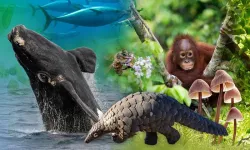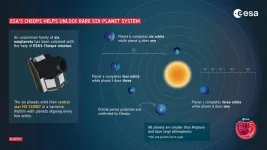(Press-News.org)
A new study has confirmed that pesticides, commonly used in farmland, significantly harm bumblebees – one of the most important wild pollinators. In a huge study spanning 106 sites across eight European countries, researchers have shown that despite tightened pesticide regulations, far more needs to be done.
While the agricultural uses of insecticides have been in the spotlight for their negative effects on bees, it has remained unknown how the effects scale beyond single substances in focal fields. Here, a large team of researchers answered recent calls for a more realistic assessment of the risks posed by mixtures of commonly used pesticides at landscape scales.
The findings, published today in the leading journal Nature, show that despite the world's most rigorous risk assessment process, the use of approved pesticides in European agricultural landscapes still negatively affects non-target organisms – significantly reducing the colony performance of bumblebees, a key wild and commercial pollinator.
Although not perhaps a major surprise, the results were nonetheless sobering. Bumblebee colonies exposed to these pesticides saw significant reductions in 1) total colony production (the number of cocoons), 2) maximum colony weight, and 3) the number of new queens.
“When you step outside the laboratory, a challenge of ecotoxicology is to capture the effect of real-world practices at organism-relevant scales,” said Dr Charlie Nicholson, co-lead author and postdoc at Lund University. “With the largest experimental field deployment of any pollinator, we see that bumblebees encounter multiple pesticides in agricultural landscapes, resulting in fewer offspring. On top of this, pesticides do more harm in landscapes with less habitat.”
Dr Jessica Knapp, co-lead author, now at Trinity College Dublin, said: “The data also show us how bumblebees perform when we use less pesticides. These ‘healthier’ colonies that experience less pesticide risk help us generate a baseline to show that 60% of our bumblebee colonies would fail proposed pollinator protection goals.
“Our findings show that the current assumption of pesticide regulation – that chemicals which individually pass laboratory tests and semi-field trials and are considered environmentally benign – fails to safeguard bees and potentially other pollinators that support agricultural production and wild plant pollination.”
The study forms a key output of PoshBee – a pan-European project seeking to monitor and improve bee health.
“The scale of this work provides a step-change in our understanding of the impact of agrochemicals on pollinator health. It was possible through EU funding that supported the project involving 13 countries. Bumblebees, and other animals, do not recognise international borders, and to protect them, we need to take a similarly international approach,” saidPoshBee coordinator Prof. Mark Brown, Royal Holloway University of London.
Prof. Jane Stout at Trinity College Dublin and coordinator of the pan-European field experiment added: “This work was possible because of the collaboration and dedication of the transdisciplinary field teams in each country and the partnership with the labs that conducted the common analyses. Researchers, beekeepers, and farmers worked together to implement common protocols to collect these unique data. Similar collaborative approaches will be needed if we are to turn the tide and offer the far greater protection that pollinators need.”
The study findings support the need for sustainability goals to reduce pesticide use and risk – critical challenges highlighted at the Convention on Biological Diversity’s COP 15 meeting and a vital part of the European Farm to Fork strategy – with anticipated benefit to bees and, potentially, their pollination services.
Dr Maj Rundlöf, the senior author and researcher at Lund University, concluded: “Our work supports the development of landscape-based environmental risk assessment and post-approval monitoring of bees’ pesticide exposure and effects. Our approach is promising for this, but there is also a need to better understand how the wider pollinator community is exposed to and potentially impacted by pesticide use.”
Ireland is already leading in reducing the use and risk of pesticides by 2050. But knowing that pesticides do more harm in landscapes with less habitat reiterates the importance of the All Ireland Pollinator Plan for boosting pollinator habitat across Ireland, which can, to some extent, mitigate the pesticides our bees are exposed to.
END
EMBL’s European Bioinformatics Institute (EMBL-EBI) has launched the Global Biodiversity Portal – an open access data portal that will consolidate genomic information from different biodiversity projects within the Earth BioGenome Project.
Sequencing and storing the genomic data of all species on Earth is vital for future conservation and biodiversity efforts. In an era where biodiversity is under threat from various environmental pressures, there is an urgent need for centralised, accessible, and actionable data. ...
Embargoed until November 29 11 a.m. ET
A new study led by Dr. Annette Dekker, an assistant professor in the Department of Emergency Medicine at UCLA, calls for the U.S. Immigration and Customs Enforcement (ICE) detention centers to increase health outcome reporting for detained immigrants to monitor the quality of medical care. Pulling from three different data sources, the researchers found discrepancies in care reported by emergency medical services (EMS) compared to ICE reports.
Building upon work that reviews deaths that occur at ICE detention centers, Dekker and colleagues sought to address concerns that individuals detained by ICE ...
Have you ever wondered why we carry two copies of each chromosome in all of our cells? During reproduction, we receive one from each of our parents. This means that we also receive two copies, or alleles, of each gene – one allele per chromosome or parent.
Both alleles are able to produce messenger RNA, which is the recipe needed to make proteins and keep cells running. Scientists hypothesize that having two alleles for each gene is the cell’s in-built redundancy system. If there is ever a mutation or drop in messenger RNA production from the allele carried on one of the chromosomes, the allele on the second chromosome will serve as a backup and ...
Scientists have discovered a rare sight in a nearby star system: Six planets orbiting their central star in a rhythmic beat. The planets move in an orbital waltz that repeats itself so precisely it can be readily set to music.
A rare case of an “in sync” gravitational lockstep, the system could offer deep insight into planet formation and evolution.
The analysis, led by UChicago scientist Rafael Luque, will be published Nov. 29 in Nature.
“This discovery is going to become a benchmark system to study how sub-Neptunes, the most common type of planets outside of the solar system, form, evolve, what are they made of, and if they possess the ...
A marvel of modernity is the ability to collaborate with others regardless of location. Researchers can work with a colleague, maybe the only person who has a specialized skill, even if they are halfway across the globe. They can pull together a powerhouse team with a dozen of the brightest minds in the field.
Yet, according to research from the lab of Lingfei Wu, assistant professor in Pitt’s School of Computing and Information, these collaborative teams are producing fewer truly disruptive ideas or radical innovations than ...
An international collaboration between astronomers using the CHEOPS and TESS space satellites, including NCCR PlanetS members from the University of Bern and the University of Geneva, have found a key new system of six transiting planets orbiting a bright star in a harmonic rhythm. This rare property enabled the team to determine the planetary orbits which initially appeared as an unsolvable riddle.
CHEOPS is a joint mission by ESA and Switzerland, under the leadership of the University of Bern in collaboration with the University of Geneva. Thanks to a collaboration with scientists ...
The World Cultural Council (WCC) is now accepting nominations for the “Albert Einstein” World Award of Science and the “Leonardo da Vinci” World Awards of Arts.
Nominations must be submitted by 26 January, 2024. NOMINATE NOW: To nominate online or for further details of the awards visit the WCC website Nominations page.
Ideal candidates for the “Albert Einstein” World Award of Science are scientists whose achievements can serve as an inspiration for future generations. This award is granted each year. Consideration will be given to ...
(Boston)—Casey Taft, PhD, professor of psychiatry at Boston University Chobanian & Avedisian School of Medicine, has been approved for a five-year, $2.8 million funding award from the Patient-Centered Outcomes Research Institute (PCORI) for his research study “A Randomized Controlled Trial to Evaluate a Trauma-Informed Partner Violence Intervention Program.”
Taft, who also is a staff psychologist at the National Center for PTSD in the VA Boston Healthcare System, is conducting a randomized controlled trial of the Strength at Home program to prevent and end intimate partner violence (IPV) in Rhode Island. Strength at Home ...
FRANKFURT. Prof. Bernhard Brüne, Vice President Research, Early Career Researchers and Transfer at Goethe University Frankfurt, congratulated the researchers involved in the successful application: "Anyone who establishes a major project like a Collaborative Research Center must have both creative and viable research ideas as well as a strong network. To discover new things about language and thinking, the new CRC 1629 not only makes use of Goethe University’s structures, and the combination of philology with philosophy and didactics. It also cooperates with partner universities in Göttingen and Tübingen. Aside that, I am of course delighted that ...
Insilico Medicine (“Insilico”), an artificial intelligence (AI)-driven, clinical stage biotechnology company and leader in AI drug discovery platform technology, is hosting three webinars unveiling its latest technology breakthroughs Nov. 28-30, 2023. These new features are part of the expansion of the Company’s end-to-end Pharma.AI platform and include chat functionality, off-target screening tools, enhanced knowledge graphs and more. They represent major steps forward in the advancement of AI drug discovery.
The company is an early ...




